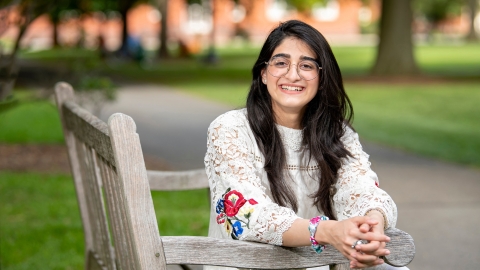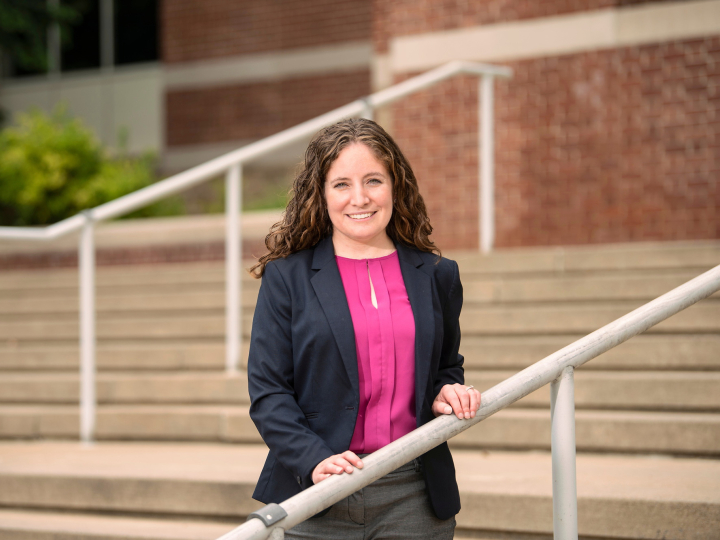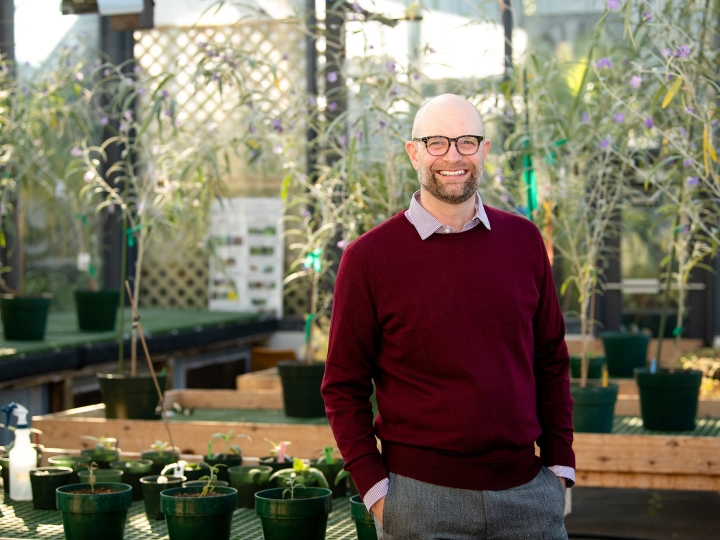
Peace-building Grant Funds Bucknellian’s Homegrown Economic Development Program
September 3, 2021
Chanzé Ahsan '22's project enrolled 50 women from Pakistan's Balochistan region in skill-building workshops on sewing, embroidery, farming and gardening. Photo by Emily Paine, Communications
Chanzé Ahsan '22 had little time to rest between her junior and senior years at Bucknell. As a recipient of the 2021 Davis Projects for Peace award, the Pakistan native went straight to work this summer tackling one of her home country's toughest crises: economic insecurity.
"The conflict in the Middle East has caused many households to lose male family members, who've become involved in the fighting or have unfortunately died due to terrorism," says Ahsan, an economics major. "So what we have now are women trying to lead households in a patriarchal society that isn't built for them to do so. They're in a particularly precarious situation where they don't have a way to provide for their families but are forced to make one."
Determined to help these families carve a path forward, Ahsan developed a training program that equips women with the skills they need to turn a profit in local markets. The program is funded by $10,000 from Projects for Peace, which supports undergraduates in designing innovative projects that facilitate conflict prevention, resolution or reconciliation.
Bucknell students are eligible to apply for Projects for Peace funding through the University's partnership with the Davis United World College Scholars international scholarship program. Previous winners from Bucknell include electrical engineering major Arsh Noor Amin '21 and mathematical economics major Spandan Marasini '21, who received funding to implement their joint proposal for a coding-for-kids program based in South Asia — a project that also won second place in the Bucknell's 2020 BizPitch competition.
Ahsan's work — completed just before her return for fall classes — focused on residents in the Balochistan region of Pakistan along the Afghanistan border. Launched in partnership with the Welfare Association for a New Generation, a youth-led nonprofit, the project enrolled 50 women in skill-building workshops on sewing, embroidery, farming and gardening.
Developing expertise in these secure and sustainable corners of the market, Ahsan hopes, will translate into tenable income for local households, as well as steady access to food sources.
"The idea is that these women will essentially develop their own small businesses so they're not just relying on a cash stipend from welfare programs, which has become insufficient in many ways during the pandemic," she says. "Giving them direct access to the market not only ensures they can thrive economically within their communities but also gives them a stronger sense of agency."
That empowerment piece is especially important to Ahsan, who has long been invested in social justice alongside her interests in microfinance and economic development. She helmed a handful of community initiatives through her high school's Social Welfare Society before coming to Bucknell, where she quickly found a home in the social-justice-themed Residential College.
Ahsan's passion for uplifting others has also led to leadership positions on the Bucknell Student Government diversity committee and within the Muslim Student Association — experiences that formed the foundation for her success in creating her Pakistan-based initative.
"Those roles gave me practice organizing, delegating and leading, which has been invaluable to me in running this operation," says Ahsan, who also makes time during the summer to redistribute surplus food to those in need as a volunteer with a global hunger nonprofit. "Although this is my first time managing a program of this size, I feel confident and at ease because I've learned so much from interacting with others who already work in these settings."
While her impact on her neighbor's economic stability will be small to start, "even the tiniest difference still matters to me," Ahsan says. "Fifty women may seem inconsequential in a whole country of 220 million, but I personally believe that they are a huge asset that can help the whole nation move forward if we invest in their potential."

